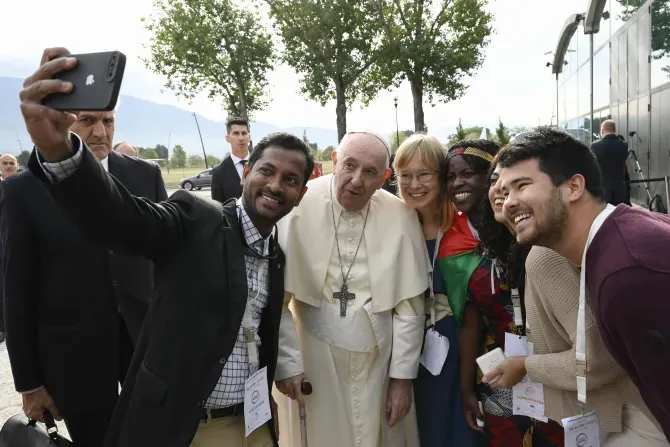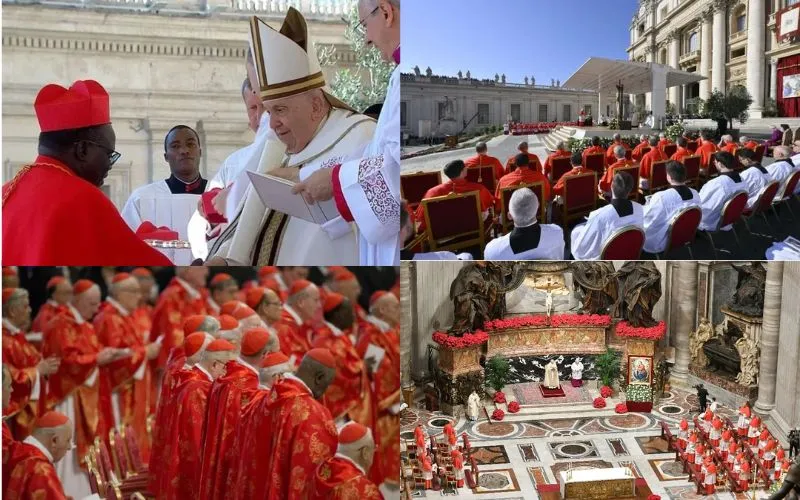The national steering committees have been working under the theme, “Building Bridges of Faith Across the Continent” to offer the university students the resources they require to engage with the Holy Father.
The committees were expected to help each local university to set up the youth cohorts based on the principles and criteria that the coordinators of the initiative provided.
A letter to those who had been selected members of the various steering committees further read, “It will also be your role to mentor the cohorts and organize the virtual national Synodal conversation with the selected youth cohorts from your country.”
“You are also expected to join the Holy Father, Pope Francis, during his virtual Synodal conversation with African Catholic university students on All Saints Day (African Youth Day, 2022),” the members of the committees were told in a concept note that was shared with ACI Africa.
Fr. Stan described Pope Francis’ envisioned engagement with the youth in African Catholic Universities as “a Kairotic moment for God’s people in Africa,” adding, that the established coordination project, is an attempt to design and sustain local, national and continental structures for realizing the dreams of African young Catholics through the Papal encounter.
(Story continues below)
“This initiative aims to use this special moment of encounter between Pope Francis and African young people to create resources for youth ministries in Africa especially in Catholic universities and other higher institutes; open spaces for listening to young Catholics in Africa through the local, national and continental listening sessions that will take place before and after the Papal encounter,” the member of the Clergy of Nigeria’s Awgu Diocese said.
Seven stages have been put in place to guide the virtual youth Synodal conversations ahead of the Papal encounter on November 1.
The first stage was the formation of the national steering committees to organize the university youth cohorts, mentor the youth, moderate the cohort-based conversations, and the national conversations while providing the cohorts the resources they need for effective Synodal experience.
Organizers of the initiative have underlined the need to make the encounter a “student-centered and university-led effort to teach and nurture the virtues of Synodality in students.”
Fr. Stan makes reference to insights that Prof. Peter Jones, who coordinated the conversation between North America/Latin America and Pope Francis when he said, “This is a student-centered, university-led initiative that is adjacent to and indirectly contributing to the Synod right now, but which will endure beyond October 2023. Our grand hope was that we were setting the stage for deeper international engagements among students and young people for the long term and in a way that teaches them in part through experience in a Synodal-type process.”
The second stage of the initiative involved the formation of cohorts of 15-30 students in Catholic universities in each country of Africa.
Coordinators of the initiative announced that for the first six months of the initiative, students would be selected from countries with existing ground persons and youth animators. These include Cote d’Ivoire, Democratic Republic of Congo (DRC), Kenya, Nigeria, South Sudan, Uganda, and Zambia.
“Other cohorts will be established in other countries of Africa as the project unfolds,” Fr. Stan said in the note he shared with ACI Africa.
University students to be selected for the initiative are those who have demonstrable leadership qualities and who are “committed to their faith in some recognizable ways,” Fr. Stan said.
He added, “We are particularly interested in youth influencers, those who even at this stage in their lives already have positive and impactful digital footprints. These are young university students who are already equipped with social marketing skills that can be tapped into in driving the agenda and pastoral plan of Pope Francis and local churches in Africa for the evangelization of the youth by the youth, and the transformation of the youth through adequate pastoral plans and accompaniment.”
In the third stage, about five Bishops were selected in each country to serve as Episcopal conversation partners for the national digital youth Synodal conversations.
Next was the organization of national digital youth Synodal listening sessions between all the cohort members from the respective universities and the Episcopal conversation partners, and the national steering committees.
The next stage is the Pan-African continental digital youth Synodal listening session between representatives of the cohorts from the seven countries and the Episcopal conversation partners chosen from the seven participating countries.
At the end of the listening session in stage five, the questions and experiences that will be shared with Pope Francis will be gathered and sent to the coordinating office at the Vatican at least two weeks before the meeting with Pope Francis.
Stage six will be the listening session between Pope Francis and representatives of the cohorts from the seven countries, the steering committees from the seven countries and selected African Bishops.
Also participating in this listening session will be Vatican coordinating team members, and Coordinating consultant, Prof. Peter Jones and his team from North America and Latin America.
In the final stage, participants in the dialogue will be called upon to take back the fruits of this listening exercise to the universities for implementation as the fruits of the deliberation.
They will also be required to continue the work with different National Pastoral Commissions for Youth and the Catholic Education Department of different National Conference of Catholic Bishops, Dioceses, and Religious Orders, and university Chaplaincies.
Participants in the conversations will also be required to expand the original cohorts in each university among other initiatives that will emerge through the Papal encounter.
Fr. Stan noted that the conversation and consultation will be Synodal in nature, and explained, “The cohorts at each stage of the conversation will take back to their peers in their respective universities the fruits of the conversation.”
“The hope is that this back-and-forth momentum will generate some interest on the themes, topics and issues emerging from the lived experiences of African young people and their unique context and daily joys, sorrows and dreams,” he said.
Fr. Stan added, “It is also hoped that it will inspire the emergence of processes and programs that could strengthen the ecclesial experience of young people and their faith leadership in the Catholic academy and beyond.”
The Catholic Priest who runs African Catholic Voices, a platform where African Catholics share their faith experiences, noted that the young people’s Synodal conversations will be live streamed through multiple social media platforms and local Catholic media.
Agnes Aineah is a Kenyan journalist with a background in digital and newspaper reporting. She holds a Master of Arts in Digital Journalism from the Aga Khan University, Graduate School of Media and Communications and a Bachelor's Degree in Linguistics, Media and Communications from Kenya's Moi University. Agnes currently serves as a journalist for ACI Africa.








